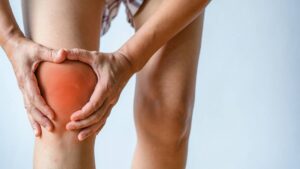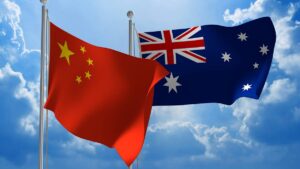Vitamin small caps look healthy as Star Combo jumps 58pc on ASX debut

Pic: REB Images / Tetra images via Getty Images
Vitamin maker Star Combo Pharma made a strong ASX debut today, joining a health supplements sector that is looking pretty fit.
The stock (ASX:S66) finished its first day at an intraday high of 79c — a 58 per cent premium to its 50c issue price.
Star Combo raised $5.8 million selling 11.6 million shares at 50c and another $1.2 million selling 2.5 million shares to Chinese early stage investor Richlink Capital at 47c.
More than 3.4 million shares changed hands in its first day of trade. There are about 75.5 million shares on issue.
While $2 billion Blackmores (ASX:BKL) is the sector’s large cap bellwether, there are more than 15 ASX-listed small caps offering exposure to vitamins and health supplements.
The theme has performed pretty well over the past year, driven by demand from China, expansion into dairy products and pot stock boosts for those exploring cannabis-infused health supplements.
Probiotics seller Bioxyne is up 380 per cent over the past year. Neutraceutical maker Probiotec is up 155 per cent.
Jatenergy is up an astounding 1000 per cent — though largely due to its entry into the popular infant milk formula business.
>> Scroll down for a list of ASX small caps in the vitamins and dietary supplements game
China is the new supplement sales pitch
China is where Star Combo — and many of its peers — are looking for customers.
Already AuMake (ASX:AU8), JatEnergy (ASX:JAT), China Dairy Company (ASX:CDC) which sells vitamin-infused milk, and Eagle Health Holdings (ASX:EHH) have or are trying to crack the Chinese market.
Blackmores (ASX:BKL) is the bellwether many are trying to emulate, after lifting half-year profit by 20 per cent to $34 million in February on the back of Chinese sales.
The Chinese supplement market has gained the most market share since 2006, making up 14.3 per cent of the global industry by 2016, according to the Nutrition Business Journal.
Asians buys $15 billion of herb and botanical-based supplements annually, but sports, meal and homeopathic supplements are seeing double-digit growth in the region as well.
Consulting firm McKinsey says the global supplements market is now worth $US82 billion ($110 billion) — with about 28 per cent of that in the US.
The Australian sector is said to be worth about $2.6 billion.
Ageing populations, awareness of preventative healthcare, “self-directed consumers” who Google their health answers, more advertising channels and a shift from marketing ingredients to brands have helped build the market.
Probiotec, which makes neuraceuticals and “Celebrity Slim” weight-loss shakes is up 155 per cent for the past year. It recently upgraded its profit outlook by 10 per cent
Bioxyne, which sells dietary supplements such as probiotics and nutritional shakes, is up 380 per cent over the past year.
Jatenergy — which sells vitamins an neutraceuticals into China — is up an astounding 1000 per cent over 12 months.
Both Bioxyne and Jatenergy got big boosts from their moves into dairy.
Eagle Health is trying the meal replacement market by selling diabetes shakes. Holista CollTech (ASX:HCT) makes most of its income from dietary supplements but mving into health foods including diet noodles aimed at Asian markets.
>> Here’s a list of ASX small caps in the vitamins and dietary supplements game:
| ASX Code | Company | One-year share price change | Price May 15 | Market Cap |
|---|---|---|---|---|
| CDC | CHINA DAIRY | Suspended | 0.066 | 49M |
| JAT | JATENERGY | 10.4285714286 | 0.16 | 89.5M |
| BXN | BIOXYNE | 3.8 | 0.072 | 46.1M |
| AU8 | AUMAKE (listed Oct 2017) | 2.25 | 0.26 | 68.9M |
| QBL | QUEENSLAND BAUXITE | 1.88235294118 | 0.049 | 78.1M |
| PBP | PROBIOTEC | 1.55434782609 | 1.175 | 65.7M |
| THC | THE HYDROPONICS CO | 0.867647058824 | 0.635 | 81.0M |
| EXL | ELIXINOL GLOBAL (listed Jan 2018) | 0.65 | 1.65 | 173.9M |
| CPH | CRESO PHARMA | 0.479591836735 | 0.725 | 79.4M |
| EVE | EVE INVESTMENTS | 0.375 | 0.011 | 26.8M |
| MXC | MGC PHARMACEUTICALS | 0.2 | 0.072 | 87.8M |
| AEB | ALGAE.TEC | -0.147058823529 | 0.029 | 25.2M |
| VLS | VITA LIFE SCIENCE | -0.24 | 0.76 | 41.7M |
| EHH | EAGLE HEALTH (listed Jun 2017) | -0.2875 | 0.285 | 89.2M |
| HCT | HOLISTA COLLTECH | -0.292307692308 | 0.092 | 17.5M |
The Star Combo story
Star Combo comes with solid financials and a decent story.
Star Zhang founded the business in 2004 with plans to export supplements to Asia. A deal with Terry White Chenmart pharmacies in 2017 got one of their brands into the Australian chain as well.
The company made a $1.48 million profit in the 2016-17 financial year and revenue of $9.84 million. Profit the year before was $1.59 million and revenue was $9.4 million.
Currently, the company makes 70 per cent of its revenue from contract manufacturing for other vitamin businesses and 30 per cent from sales of its branded products, but is looking to swap those numbers around.
- Bookmark this link for small cap breaking news
- Discuss small cap news in our Facebook group
- Follow us on Facebook or Twitter
- Subscribe to our daily newsletter
The founding group however, has only let go of a small percentage of the register into outsider hands, just 16.37 per cent.
Mr Zhang owns 50.55 per cent.
Chief Su Zhang owns 15.16 per cent.
Chinese medical investor Lepu was the other cornerstone investor in the IPO, taking 14.57 per cent.
Together with Richlink, those three investors own 83.63 per cent of Star Combo, and Mr Zhang retains effective control over the company he founded.
UNLOCK INSIGHTS
Discover the untold stories of emerging ASX stocks.
Daily news and expert analysis, it's free to subscribe.
By proceeding, you confirm you understand that we handle personal information in accordance with our Privacy Policy.








